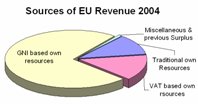This situation is not new for the Federalists who have been asking for the democratisation of the Council which decision-making system is polluted by the right of veto. Moreover, the French and Dutch no to the Constitutional Treaty have complicated this situation by blocking institutional reforms. Moreover, an alternative to this impasse does not exist, and the Commission still does not have a way of generating income which it could control
Two proposals have come up in JEF to increase the financing of the European Union: a Eurotax and Union bonds. I will concentrate my argumentation on the first element - although the two have to be implemented - because the second was tackled in previous issues of this magazine (See Eurotax and Union Bonds).
The goal of a Eurotax is to finance a more efficient European Union and although it might seem like a good idea for Federalists, it is difficult to propose to European citizens. Eurotax supporters say that paying taxes is a way to involve citizens into an “active” citizenship, while supporting the slogan “no taxation without representation”, but in actual fact, this is quite far from reality.
The example of the aborted-incentive of the French European Parliamentarian Alain Lamassoure illustrates well enough how a Eurotax is unpopular. His proposal to tax mobile phone messages and emails to fulfil the European Union budget was rejected massively by the population compelling the MEP to explain that it was just a simple idea and not a political proposal.
The rejection of this initiative does not put aside an interesting aspect of the idea - taxing a large part of the population but each time from a little amount of money. This allows the generation of a substantial sum of money by touching all Europeans without charging them too much. In this way, they can feel involved in the project without being handicapped financially.
A Eurotax can only help funding the European Union but not solve the core of the problem…
This Eurotax was rejected also because there was no direct link between emails and Europe. The Internet community was opposed to this project because they didn’t see why they would be taxed for someone/something else. This brings us to the following statement: the tax and the goal of the income perceived must be closely tied in order to make the public opinion adhere to the proposal.
Another objection to this proposal was: “why increase the European budget if it’s not used in a proper way?”. Thus, it would be impossible to implement a Eurotax without changing the decision making rules within the Council. A Eurotax can only help funding the European Union but not solve the core of the problem.
Lamassoure’s proposal regarded only the emails or phone messages moving from a European country to another. For example, if you send an instant message in the same country, you wouldn’t be taxed. This is contrary to what JEF as been promoting for, because it penalizes communication between member States in comparison to internal communication. A proper way of taxing would be to tax equally communication whether it is national or European. In that way, we will not favour national communication over international one. A Eurotax should not divide the European level and the national one.
We realise that a tax which fulfils all these criteria is very difficult to find and to promote if we want also to involve the citizens in the incentive. In addition to that, today, we are facing a lot of incentives to tax fuel, financial transactions, carbon... which are not aimed at financing Europe but something else like development aid or environmental research.
Europe has to find an original tax, which can gather the population and the member states on a real federal project.


1. On 23 November 2006 at 09:11, by catherine guibourg (écrivain) Replying to: A Eurotax to finance the European Union
Replying to: A Eurotax to finance the European Union
I find your proposal attractive but is it realistic ? The actual mood is not really to the transfer of public funds from the member states to EU, especially when the public finances in quite all EU countries are so tight. But the article is right, and for the sake of efficiency,it will be necessary ( the soon the better) to have a bigger EU budget and special taxes. This could be very good also for the appropriation ot Europe by the citizens.
Catherine blog “l’Europe dans la campagne” http://catymi.blog.lemonde.fr/
Follow the comments: |
|
